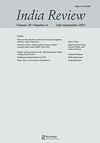Indian foreign policy as public history: globalist, pragmatist and Hindutva imaginations
IF 0.6
3区 社会学
Q3 AREA STUDIES
引用次数: 3
Abstract
ABSTRACT Public histories are narratives straddling across space and time, challenging the inside/outside distinction. Indian foreign policy makers have engaged in a selective remembering of the past in an attempt to script the making of a postcolonial state. The study takes up three cases from India’s foreign policy in elucidating how different imaginations of India’s identity has been refashioned to legitimize its foreign policy. These three cases point to Nehru’s decision to join the Commonwealth, Vajpayee’s strides for nuclearization and Modi’s approach toward the diaspora. We argue that foreign policy makers in India have either refrained from engaging with ‘public history’ due to their uncritical positioning in structural realism or erected versions of the past that happily rationalize their contemporary practices. The deployment of public histories has taken place to invoke India rightful place in the international order and as instruments in shaping public consensus which advances the interests of the elites in validating their foreign policy choices. This elite-driven exercise is shot through the dominant Western imaginations and cognitive categories although these elites self- consciously took charge of the destiny of a nation that had to be refashioned as ‘post- colonial.’作为公共历史的印度外交政策:全球主义者、实用主义者和印度教的想象
摘要公共历史是跨越空间和时间的叙事,挑战着内外的区别。印度外交政策制定者对过去进行了选择性的记忆,试图描绘后殖民国家的形成过程。这项研究从印度外交政策中选取了三个案例,以阐明对印度身份的不同想象是如何被重塑以使其外交政策合法化的。这三个案例指向了尼赫鲁加入英联邦的决定、瓦杰帕伊在核化方面的进步以及莫迪对侨民的态度。我们认为,印度的外交政策制定者要么由于其在结构现实主义中的不加批判的定位而避免参与“公共历史”,要么乐于将其当代实践合理化的过去版本。公共历史的部署是为了唤起印度在国际秩序中的合法地位,并作为形成公众共识的工具,促进精英们在验证其外交政策选择方面的利益。这种精英驱动的运动是通过占主导地位的西方想象和认知类别进行的,尽管这些精英有意识地掌控着一个不得不被重塑为“后殖民主义”的国家的命运
本文章由计算机程序翻译,如有差异,请以英文原文为准。
求助全文
约1分钟内获得全文
求助全文

 求助内容:
求助内容: 应助结果提醒方式:
应助结果提醒方式:


